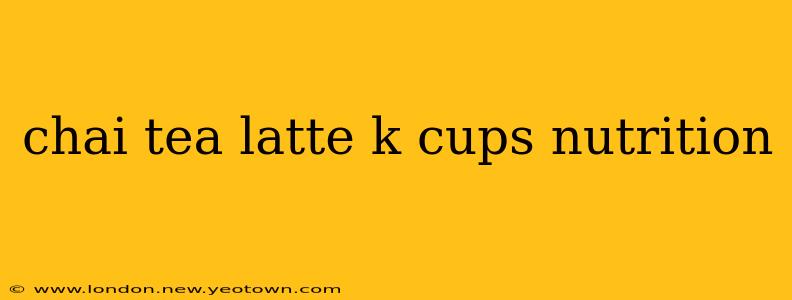The comforting warmth of a chai tea latte on a chilly morning is hard to beat, especially when it's as easy as popping a K-Cup into your brewing machine. But what's really in that convenient little cup? Let's delve into the nutritional details of chai tea latte K-cups, exploring the ingredients, calorie count, and potential health impacts. This isn't your grandma's chai—we're going beyond the surface to uncover the truth about this popular beverage.
What are the ingredients in a chai tea latte K-Cup?
This is where things get interesting. The ingredient list can vary dramatically depending on the brand. Generally, you'll find a blend of black tea, spices (cinnamon, cardamom, ginger, cloves are common), milk solids (often powdered milk or non-dairy alternatives), and sweeteners (sugar, artificial sweeteners, or a combination). Some brands might add flavor enhancers or natural flavorings. Always check the specific product label for the most accurate information, as recipes differ from one brand to another. This is crucial as ingredient variations directly impact the nutritional profile.
How many calories are in a chai tea latte K-Cup?
Calorie counts fluctuate widely depending on the brand and the specific recipe used. A single serving can range from around 80 calories to well over 150. This significant difference stems from variations in the amount of added sugar and milk solids. Those seeking lower-calorie options should scrutinize the nutrition facts panel carefully and compare brands. Look for versions with reduced sugar or naturally sweetened alternatives.
Is chai tea latte from a K-Cup healthy?
The "healthy" label is subjective and depends heavily on individual dietary needs and preferences. While chai tea itself offers potential health benefits thanks to the antioxidants in black tea and the anti-inflammatory properties of certain spices, the added sugars and processed ingredients in many K-Cup versions can negate those advantages. Excessive sugar consumption is linked to various health issues, such as weight gain, type 2 diabetes, and heart disease. Therefore, moderation is key. If you enjoy the convenience of K-Cups, choose options with lower sugar content and consider incorporating them into a balanced diet.
Are there healthier alternatives to chai tea latte K-Cups?
Absolutely! Making your own chai latte at home offers complete control over ingredients. This allows you to use natural sweeteners like honey or maple syrup, opt for unsweetened milk or plant-based alternatives, and adjust the spice levels to your preference. This approach lets you enjoy the delicious flavors of chai without the added sugars and processed components often found in pre-packaged K-Cups. It's also a more environmentally friendly choice, reducing waste from single-use pods.
What are the benefits of making chai tea latte at home?
Aside from health benefits derived from controlling ingredients, making your chai latte at home offers numerous advantages:
- Cost Savings: Making your own is significantly cheaper in the long run than consistently purchasing K-Cups.
- Customization: Tailor the sweetness, spice levels, and milk type to your exact liking.
- Environmental Friendliness: Avoids the waste associated with disposable K-Cups.
- Healthier Ingredients: Allows you to use fresh, whole ingredients, reducing your intake of processed additives and sugar.
What are the downsides of using chai tea latte K-Cups?
- Higher Sugar Content: Many commercially available K-Cups contain a considerable amount of added sugar.
- Cost: While convenient, K-cups are often more expensive per serving than making your own chai.
- Environmental Impact: Single-use plastic pods contribute to environmental waste.
- Less Control Over Ingredients: You're reliant on the manufacturer's formulation, which may contain additives or preservatives you'd prefer to avoid.
In conclusion, while chai tea latte K-Cups offer undeniable convenience, carefully consider their nutritional profile and potential health implications. Making your own chai latte empowers you to control ingredients, promotes healthier habits, and reduces your environmental footprint. The choice ultimately depends on your individual priorities and lifestyle, weighing the convenience of a quick brew against the benefits of a healthier, more conscious beverage choice.

